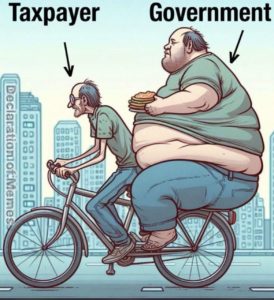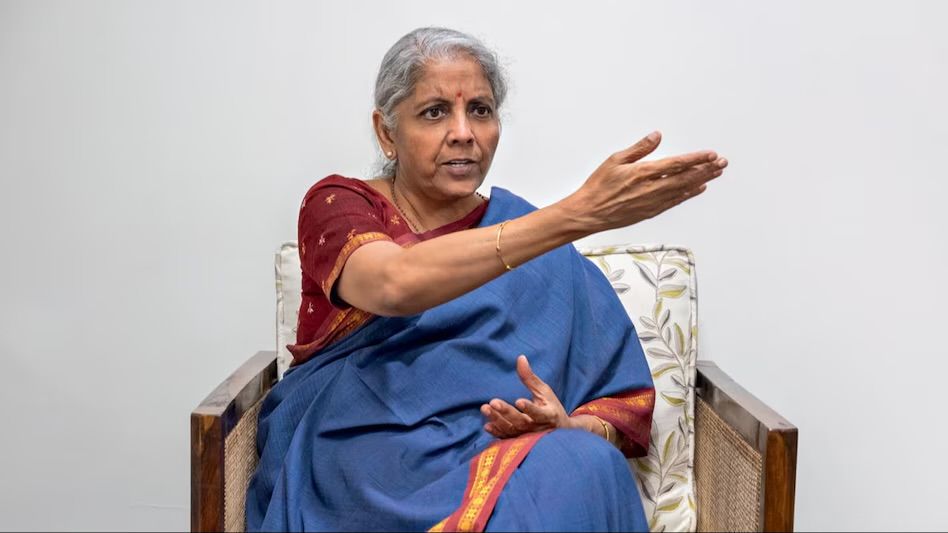MARKET PERSPECTIVE
By J Mulraj
JULY 20-26, 2024
A Tinkerer’s Budget by Nirmala Sitharaman
There are 74 million individuals who file income tax returns in India, of which 51 million had no tax liability. So a mere 22.4 million individuals (1.6% of India’s population) pay Income Tax. Yet their share of Government revenue from income tax is, at 19%, more than the share of corporates, at 17%.
One would have expected the Finance Minister to have recognized the contribution made by 1.6% of our population, higher than that of all companies, listed and unlisted, and to reward them for their hard work in earning the income to generate the tax.
Sadly, she continues to squeeze more from them.
All individuals aspire to buy a house. As their family grows they may plan to sell it and move to a smaller town or city, to cash in on the appreciation in value. Earlier Governments had recognised that a great chunk of this appreciation had come from inflation, primarily caused by Governments fiscal policy and wasteful spending. They had, correctly, allowed, for purposes of computation of capital gains, an indexation of cost, to compensate for inflation. In other words, if the property had appreciated from 100 to, say, 300, over 10 years, of which 150 was due to overall inflation, the seller would be deemed to have made a gain of 50. He could thus pay less capital gains tax, moving to another location, and use the saving to generate retirement income.
Now that indexation is abolished, his tax burden will increase and his retirement would be more burdensome. Is that a reward to individuals for giving you more tax revenue than the corporate sector? Mrs Sitharaman?
No! It is, verily, a type of estate duty, collected when the taxpayer is still alive!
In the budget she has, correctly, reduced import duty on gold from 15% to 6%. The myopia of the Government is evidenced from the fact that it was only in January 2024, six months ago, that the Government had raised duty from 10% to 15%. This hike had been criticized for the risk of increased smuggling of gold. The reduction in import duty, within 6 months, confirms the apprehension.
She has unnecessarily tinkered with the number of income tax slabs. There were 4 slabs in the old regime, 0%, 5%, 20% and 30%. In the new regime there are 6, viz. 0%, 5%, 10%, 15%, 20% and 30%. Oh come on! Are you seriously considering this progress? Do you really consider this will spur honesty and increase the % of individual tax payers?
The Budget has tinkered, unnecessarily, with tax on share buybacks. Proceeds of buy backs will be taxed as dividend and a capital loss on them can be offset only against a capital gain. Tax rates on the former are higher than on the latter.
Besides direct taxes the Government collects huge indirect taxes, from GST. Here, too, there is a 5 rate structure from 0%, 5%, 12%, 18% and 28%. In addition, there is a cess meant to discourage consumption of cigarettes, tobacco, luxury cars and aerated drinks. It has worked for cigarettes/tobacco, which have seen a 34% decline (perhaps more because of awareness of it causing cancer than the cess) but not for luxury cars or aerated drinks, whose consumption has increased.
In the past four years, the Government has collected, through GST, ₹11.4 trillion in 2020-21, ₹ 14.8 trillion, ₹ 18.1 trillion and ₹ 20.1 trillion in 2023-24. That’s a 76% increase in four years. GST is a flat tax, equally applicable to all. A reduction in GST rates should be made. The highest rate of 28% only serves to encourage cash transactions to avoid it, much like the 15% customs duty on gold encouraged the smuggling of it. Having realized the latter, it’s time Mrs. Sitharaman recognize the former.
As per this article in Times of India, 30% of Government outlay goes towards Central sector schemes (16%), Centrally Sponsored Schemes (8%) and Subsidies(6%). Whilst it is the obligation of any Government to assist the disadvantaged, it is, simultaneously, the duty of the Government not to create a dependency on handouts.
Both direct and indirect taxes, combined, impose a huge burden on Indian citizens even as the Government grows more corpulent because of them, as best illustrated in the cartoon below.
 The FM has, though, recognized the imperative need for job creation/skilling and has provided ₹ 2 trillion towards it. As per the Economic Survey, India needs to create nearly 8 million non-farm jobs a year till 2030. For manufacturing jobs, she should look at the impediments for FDI (foreign direct investment) which reduce it. One of the primary impediments is the slowness of our judicial system in resolving commercial disputes. It moves at the pace of a lazy centipede with gout. Foreign companies prefer the quicker process of international arbitration. However there are now only 2 jurisdictions left where this is allowed, Netherlands and Singapore.
The FM has, though, recognized the imperative need for job creation/skilling and has provided ₹ 2 trillion towards it. As per the Economic Survey, India needs to create nearly 8 million non-farm jobs a year till 2030. For manufacturing jobs, she should look at the impediments for FDI (foreign direct investment) which reduce it. One of the primary impediments is the slowness of our judicial system in resolving commercial disputes. It moves at the pace of a lazy centipede with gout. Foreign companies prefer the quicker process of international arbitration. However there are now only 2 jurisdictions left where this is allowed, Netherlands and Singapore.
This tardiness of the judicial system is like another tax on the honest individual. What’s left after paying income tax and GST is at risk of being stolen by Ponzi scamsters or cyber fraudsters, with little or no judicial remedy. Thousands of individuals, victims of Ponzi schemes like NSEL, Sarada, Rose Valley and others, await justice. They have been orphaned by the Government, the various investigative agencies who are too busy chasing whales to care about salmon. And from the judiciary, the victims get dates, not the edible ones.
In world news, President Biden bowed out of the Presidential race, nominating VP Kamala Harris as his favored candidate for the task. With 4 months to go before the November election, one wonders if she will be ready for the job, not having shown adeptness at stanching the flow of illegal immigrants at the border, as she was tasked to do.
If Trump becomes President again, he will swiftly end support to countries engaged in conflict. US must learn to protect its own borders first. He would also escalate the trade war with China, strive to make America energy-independent, as it was in his previous presidency, (drill, baby, drill), deport most of the 10 million immigrants Biden and Kamala have let in, and reduce American assurances to keep the seas protected for international trade. That would adversely affect global trade and lower global GDP.
Last week the BSE Sensex was down 272 points, ending the week at 81332 .
On the global stage, India is the only large economy which is delivering good economic growth, thanks largely to favourable demographics and a young population. What the FM needs to do is go on a fiscal diet, reducing and rationalizing tax rates and slabs (which will fetch higher revenue), review and rationalise the plethora of schemes and subsidies using 30% of revenue, and for which the FM has to devise convoluted ways to raise revenues (such as abolition of indexation benefits to compensate for inflation Government spend has caused, and to work with the PM and the judiciary to bring down a shameful backlog of pending cases, so that FDI can come in larger numbers and provide jobs.
Perhaps if she got off the comfortable poof and used a hardwood seat, she may see that unless these steps are taken, the sheen will swiftly disappear from the India story.
Comments may be sent to Jmulraj@asiaconverge.com










































COMMENTS